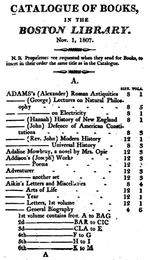Boston Library Society
.jpg)
The Boston Library Society was an American subscription library established in New England's pre-eminent city, Boston, during 1792. Early subscribers included Revolutionary War figures Paul Revere and William Tudor. The society existed until 1939 when it merged into a larger historical library known as the Boston Athenæum.
Brief history
1792–1858
The Boston Library "circulated polite general reading for ladies and gentlemen".[1] It operated from rooms in the newly built Tontine Crescent, designed by Charles Bulfinch, who also served as one of the library's trustees.
Early subscribers, in addition to Revere and Tudor, included: Hannah Barrell, James Bowdoin III, Dr. Thomas Bulfinch, Rev. John Clarke of First Church, Abigail Howard, Sally Hubbard, Deborah Jeffries, Mary Langdon, Jedidiah Morse, Sarah Wentworth Apthorp Morton, James Perkins and Thomas Handasyd Perkins. The library maintained detailed records of its holdings and circulation activities. For instance, in 1794, Paul Revere borrowed works by Chevalier de Jean Francois Bourgoanne, Elizabeth Inchbald, James Cook, William Coxe, Elizabeth Craven, Charles-Marguerite-Jean-Baptiste Mercier Dupaty, Edward Gibbon, Alexander Jardine, Johann Kaspar Lavater, William Shakespeare, Joshua Townshend, and Comte de Volney.[1][2]
In the first years of the library, Nathan Webb served as secretary, 1794–1826. Henderson Inches, Allan Pollock, William Walter and Charles Hammatt were successive treasurers. Librarians included Caleb Bingham (1792–1797), Nathan Davies (1797–1803), Cyrus Perkins (1803–1806), James Day (1809–1811), Charles Callender (1813–1828), John Lee (1828–1840) and George S. Bulfinch (1840–ca.1845). Numerous trustees, in addition to Charles Bulfinch, supported the library through the years, including Reverend Joseph Eckley of Old South Meeting House, Reverend John Eliot, Reverend William Emerson, Samuel Hall, John Thornton Kirkland, George Richards Minot, Bishop Samuel Parker, William Scollay, Lemuel Shaw, William Spooner, Charles Vaughan and Redford Webster.[3] In 1801, Abigail Howard donated some 500 books to the library.
By 1848, the library owned "about 11,000 volumes, which have been obtained chiefly by purchase".[4]
Some of the titles in the library's collection in 1824 included:[2]
|
|
|
|

1858–1939
In 1858, the Tontine Crescent was demolished, and so the Boston Library moved to new quarters in Essex Street. The library moved again in 1870, to Boylston Place; and yet again in 1904, to Newbury Street in the city's Back Bay neighborhood. In 1939 the society merged with the Boston Athenæum.
References
- 1 2 Michael Wentworth and Elizabeth Lamb Clark. The Boston Library Society, 1794-1994: an exhibition of portraits, views, and materials related to the foundation of the society and some of its early members. Boston: Boston Athenaeum, 1995; p.44.
- 1 2 Catalogue of Books in the Boston Library, June, 1824; kept in the room over the arch, in Franklin-Place. Boston: Munroe and Francis, printers, 1824.
- ↑ Massachusetts Magazine, March 1794; p.192.
- ↑ Edward Edwards. A Statistical View of the Principal Public Libraries in Europe and the United States of North America. Journal of the Statistical Society of London, Vol. 11, No. 3 (Aug., 1848)
- ↑ WorldCat Protestant dissenter's magazine. London : Printed for T. Knott, 1794-1799.
- ↑ WorldCat. Benjamin Jenks 1646-1724
- ↑ WorldCat. Henrietta Saint-John Knight Luxborough
- ↑ WorldCat. Mrs. Ross
Further reading
- Catalogue of Books in the Boston Library, June, 1824; kept in the room over the arch, in Franklin-Place. Boston: Munroe and Francis, printers, 1824.
- Catalogue of the books of the Boston Library Society: in Franklin Place, January, 1844, Boston: T.R. Marvin, 1844.
Coordinates: 42°21′19.57″N 71°3′28.89″W / 42.3554361°N 71.0580250°W